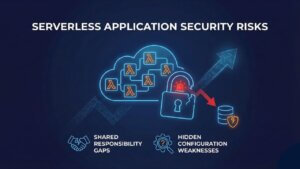As businesses embrace cloud computing to enhance efficiency and scalability, the importance of robust cloud security cannot be overstated. Yet, many organizations fail to prioritize cloud computing security, often with catastrophic consequences. This blog explores the devastating outcomes of neglecting cloud security and provides actionable steps to safeguard your digital assets.
Table of Contents
What is Cloud Computing Security?
Cloud computing security refers to a set of policies, controls, technologies, and practices designed to protect data, applications, and infrastructure in cloud computing environments. It ensures the confidentiality, integrity, and availability of cloud-hosted resources by addressing threats such as data breaches, unauthorized access, malware, and service interruptions. Key components include encryption, identity and access management (IAM), secure configurations, compliance monitoring, and regular security audits.
While cloud computing security provides a solid foundation for safeguarding your digital assets, neglecting it can lead to devastating consequences. Here are some critical outcomes businesses face when cloud security is overlooked.
1. Data Breaches and Theft

The Risk: Ignoring cloud security exposes sensitive data to breaches. Cybercriminals target vulnerabilities in cloud systems to steal intellectual property, customer information, and financial records.
The Impact:
Financial Losses: The average cost of a data breach is millions of dollars, including fines, legal fees, and operational downtime.
Reputational Damage: Loss of customer trust can lead to reduced revenue and long-term brand erosion.
Compliance Violations: Non-compliance with regulations like GDPR, HIPAA, or CCPA can result in hefty penalties.
Prevention:
Use strong encryption for data in transit and at rest.
Implement access controls and multi-factor authentication (MFA).
Regularly audit and monitor cloud configurations.
2. Ransomware Attacks
The Risk: Cloud environments are increasingly targeted by ransomware attacks, where malicious actors encrypt critical data and demand a ransom for its release.
The Impact:
Operational Disruption: Inaccessibility to data halts business operations.
Escalating Costs: Paying the ransom does not guarantee data recovery, and rebuilding systems adds to the expense.
Prevention:
Maintain regular backups and store them in a separate, secure location.
Employ endpoint detection and response (EDR) tools.
Educate employees on recognizing phishing attempts, a common entry point for ransomware.
3. Loss of Business Continuity
The Risk: Natural disasters, hardware failures, or cyberattacks can disrupt cloud services. Without a solid disaster recovery plan, businesses may struggle to resume operations.
The Impact:
Prolonged Downtime: Every minute of downtime translates to revenue loss and customer dissatisfaction.
Missed Opportunities: Inability to access critical systems can delay projects and disrupt service delivery.
Prevention:
Develop a comprehensive disaster recovery plan.
Use cloud provider tools for automated failover and replication.
Test recovery processes regularly to ensure effectiveness.
4. Compliance and Legal Consequences
The Risk: Failing to secure cloud data can lead to non-compliance with industry regulations and legal requirements.
The Impact:
Fines and Penalties: Non-compliance can result in substantial fines.
Legal Actions: Customers or partners affected by a breach may initiate lawsuits.
Prevention:
Understand the regulatory requirements for your industry.
Leverage compliance tools provided by cloud providers, such as AWS Audit Manager or Azure Compliance Manager.
Conduct regular compliance audits to ensure adherence.
5. Insider Threats
The Risk: Not all threats come from external hackers. Employees or contractors with access to cloud systems can intentionally or inadvertently compromise security.
The Impact:
Data Leaks: Misconfigured access controls can lead to sensitive data exposure.
Sabotage: Disgruntled employees may delete or corrupt critical information.
Prevention:
Implement the principle of least privilege to limit access to necessary resources.
Monitor user activity and set alerts for unusual behavior.
Conduct regular employee training on cloud security best practices.
6. Escalating Costs Due to Misconfigurations
The Risk: Misconfigured cloud resources, such as open storage buckets or unrestricted access controls, are a leading cause of security incidents.
The Impact:
Data Exposure: Sensitive data stored in unsecured environments can be accessed by unauthorized parties.
Increased Costs: Recovering from misconfigurations often involves time-intensive audits and remediation efforts.
Prevention:
Use automated tools to detect and correct misconfigurations, such as AWS Config or GCP Security Command Center.
Conduct regular configuration reviews and vulnerability assessments.
7. Erosion of Customer Trust
The Risk: Customers expect businesses to protect their personal and financial data. A security lapse can quickly erode this trust.
The Impact:
Customer Attrition: A breach can prompt customers to switch to competitors.
Negative Publicity: News of security incidents spreads quickly, tarnishing your brand’s reputation.
Prevention:
Prioritize transparent communication with customers about security measures.
Invest in advanced security solutions to demonstrate your commitment to data protection.
8. Diminished Competitive Edge
The Risk: Inadequate cloud security can hinder innovation and slow down digital transformation initiatives.
The Impact:
Lagging Behind Competitors: Businesses that cannot ensure secure operations may lose market share.
Stunted Growth: Security incidents drain resources that could be invested in growth.
Prevention:
Collaborate with cloud providers to implement cutting-edge security technologies.
Allocate budget for continuous security improvements.
Align security initiatives with business goals to drive innovation.
Why Businesses Trust SecureMyOrg for Comprehensive Network Security
At SecureMyOrg, we uncover and fix all possible security vulnerabilities of mobile and web, while providing solutions to mitigate risks. We are trusted by renowned companies like Yahoo, Gojek and Rippling, and with 100% client satisfaction, you’re in safe hands!







Some of the things people reach out to us for –
- Building their cybersecurity program from scratch – setting up cloud security using cost-effective tools, SIEM for alert monitoring, building policies for the company
- Vulnerability Assessment and Penetration Testing ( VAPT ) – We have certified professionals, with certifications like OSCP, CREST – CPSA & CRT, CKA and CKS
- DevSecOps consulting
- Red Teaming activity
- Regular security audits, before product release
- Full time security engineers.
Conclusion
Cloud computing offers unparalleled opportunities for businesses, but neglecting cloud security can lead to devastating consequences. From financial losses to reputational damage, the risks are too significant to ignore. By prioritizing robust security measures, such as encryption, IAM best practices, and regular audits, you can protect your digital assets and ensure your business thrives in the cloud era.
Don’t let a security lapse jeopardize your success. Invest in cloud security today to safeguard your business for tomorrow.
Relevant Posts

Top Cybersecurity Threats Facing Businesses In 2026
Businesses entering 2026 face a security landscape that is more complex, more interconnected, and far less forgiving than in previous years. Cybersecurity threats no longer

Top 5 Security Weaknesses Cloud-Native Apps Commonly Ignore
Cloud-native applications promise speed, flexibility, and scalability. Teams ship features faster, infrastructure adapts automatically, and operational overhead drops. Yet many organizations discover later that security

Why Weak Serverless Application Security Puts Your Business at Risk
Weak security in serverless environments often goes unnoticed until it leads to real damage. Misconfigured triggers, broad permissions, and poor visibility can expose sensitive data and disrupt business operations. Understanding where the risks appear is the first step toward building safer, more reliable serverless applications.

What Is Penetration Testing as a Service?
Penetration testing as a service (PTaaS) lets experts simulate real attacks to uncover vulnerabilities before hackers do. This guide explains the process, benefits, and costs, helping businesses strengthen defenses with predictable, ongoing security checks.

How To Inspect Encrypted Traffic Without Breaking Privacy
Network administrators face a challenge: securing systems while respecting privacy. This guide explains how to inspect encrypted traffic without breaking privacy using metadata, anomaly detection, and machine learning ensuring visibility, compliance, and trust.

How to Audit Infrastructure as Code (IaC) for Security Vulnerabilities
Discover how to audit Infrastructure as Code (IaC) for security vulnerabilities with this practical guide. Learn to scan IaC files using tools like Checkov, fix issues like exposed resources, and integrate audits into CI/CD pipelines. Protect your cloud systems from misconfigurations and ensure compliance with clear, actionable steps.
